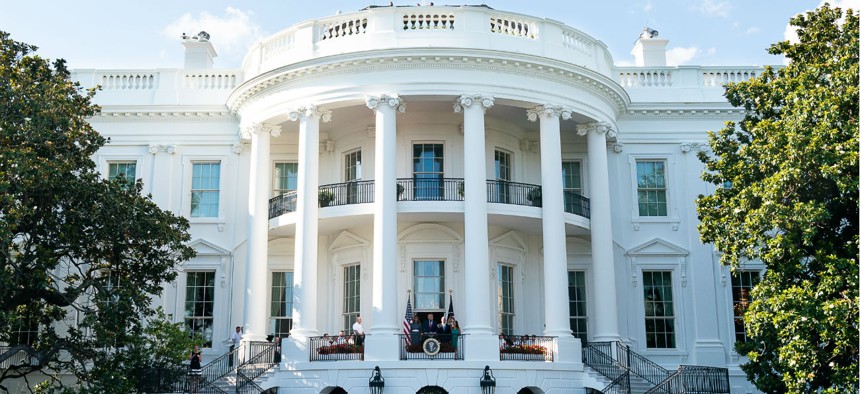
President Trump delivers remarks from the Blue Room Balcony during the Congressional Picnic at the White House on June 21. Official White House Photo by Andrea Hanks
White House Sees Path for Less Interference in Implementing Its Government Reorganization
Administration officials are pleased with progress so far, though most efforts are not yet implemented.
The White House on Tuesday expressed confidence it can continue to move forward unilaterally on key provisions of its efforts to reorganize federal agencies, thanks in part to an agreement tucked into the recent budget deal.
The Trump administration has made significant progress in implementing its proposals to reorganize government, Office of Management and Budget Deputy Director for Management Margaret Weichert told reporters, though she conceded many of those reforms are still in the preliminary or planning phases. She expects more progress going forward, and she does not anticipate that Congress will block agencies from instituting changes in forthcoming appropriations bills for fiscal 2020.
The White House unveiled 32 reorganization proposals in June 2018, most of which remain largely unimplemented. Lawmakers from both parties have pushed back on key elements of the plan and the administration has repeatedly faced criticism for failing to provide details and justifications for the reforms. The original implementation memorandum calling for reorganization proposals from agencies also requested plans to slash their workforces, but the administration has since wavered on whether that is still a priority.
The administration previously told Congress it was still reviewing exactly what will require legislation and what it can accomplish on its own, but estimated there are 10 to12 proposals that the White House could institute without legislation. Congress has taken some steps to prevent any unilateral reorganization activity, and has failed to move legislation that would authorize expedited approval of reform efforts.
According to an analysis from the Congressional Research Service last year, 19 of the administration’s proposals required legislation, while 15 could at least mostly proceed administratively. Some high-profile successes from the reorganization blueprint to date include moving all background checks to the Defense Department, consolidating development finance tools, creating new tools to hire cybersecurity specialists and retraining existing feds to fill those slots, and beginning the process to stand up a new government think tank.
A senior administration official suggested that agencies are using existing authorities to implement 20 of the administration's 32 proposals, but conceded most of those are only underway “in part.” The official said OMB was counting, for example, the departments of Agriculture and Health and Human Services simply holding discussions over how to “streamline jurisdictional issues” related to food safety, still falling well short of its original proposal for a full merger of those components. Similarly, OMB included in its count a task force established by President Trump to recommend reforms to the U.S. Postal Service, a far cry from its initial reorganization proposal to privatize the mailing agency. None of the task force’s major recommendations have been acted on.
In a report detailing the one-year reorganization update, OMB also noted Congress has “taken action to consider at least 10 of the proposals.” Those actions include hearings or discussions with staff, however, and few have been passed into law.
The administration is looking to plow forward on its proposal to eliminate the Office of Personnel Management as an independent agency and fold its functions into the White House’s Executive Office of the President and the General Services Administration, despite roadblocks set up by Congress. Many of the changes are likely to require legislative approval, though Weichert stressed OPM can move some transactional services to GSA on its own.
A senior administration official was hopeful that as agencies throughout government tinker around the edges to the extent they are allowed under the law, they will find less controversial “technical opportunities” that Congress will be amenable to addressing legislatively. The official noted congressional efforts to stymie the administration from moving forward administratively implicitly recognized that agencies otherwise had the authority to implement some reforms on their own.
“Some of the cynical poison pills that have been put out there reflect an actual understanding that we do have the authority in the executive branch, as a coequal branch afterall, to make some changes,” the official said.
The official said a recent budget deal that is expected to reach Trump’s desk this week, which included an informal agreement to leave out “poison pill” riders during the appropriations process, would help the administration make more progress on its reorganization proposals.
“It was a priority of this administration to ensure that we can move forward with the agenda that reflects what the American people are looking for which is more efficiency and effectiveness in their government,” the senior official said.
Weichert suggested the removal of poison pills “absolutely help us continue on the path” toward phasing out OPM as an independent agency. House Democrats, who have sought to block major changes at OPM and other reorganization efforts through the fiscal 2020 appropriations process, denied that the agreement would affect those efforts.
“The provision on poison pills simply restates the reality of divided government: bipartisan agreement is required to pass spending bills,” a Democratic aide told Government Executive earlier this week. “The House will still be able to negotiate on these provisions in conference.”
Weichert stressed the passage of the Better Utilization of Investments Leading to Development (BUILD) Act, which accomplished the administration's goal of consolidating development finance tools, and legislation enabling the transfer of security clearance processing from OPM to Defense serve as “proof that we can actually make change happen” through bipartisan legislation.
Weichert said Defense is on track to absorb the National Background Investigations Bureau by Oct. 1, and employees on Monday received notification of their forthcoming transfers.
Overall, Weichert said she was pleased with the progress the administration has made on its reorganization efforts.
“The goal was not to do all of this reform at once,” she said. “You want to take it in steps.”







